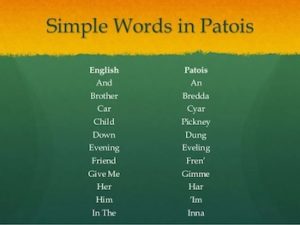
*Jamaican Creole is celebrated on this date in 1692.
Jamaican Patois, also known locally as Patois (Patwa or Patwah) and referred to as Jamaican Creole by linguists, is an English-based Creole language with significant West African influences. Most non-English loan words are of Akan Ashanti origin. It is spoken primarily in Jamaica and among the Jamaican diaspora; the majority of Jamaicans consider it their native language.
Patois developed in the 17th century when slaves from West and Central Africa were exposed to, learned, and nativized the vernacular and dialectal forms during the Middle Passage. The English language was spoken by the slaveholders: British English, Scots, and Hiberno-English. Jamaican Creole exhibits a gradation between more conservative Creole forms that are not significantly mutually intelligible with English and forms virtually identical to Standard English. Jamaicans refer to their language as Patois, a term also used as a lowercase noun to describe a catch-all category that encompasses pidgins, creoles, dialects, and vernaculars.
Creoles, including Jamaican Patois, are often stigmatized as a low-prestige language even when spoken as the mother tongue by the majority of the local population. Jamaican pronunciation and vocabulary are significantly different from English despite the heavy use of English words or derivatives, but the writing system shows commonalities with the English alphabet. Significant Jamaican Patois-speaking communities exist among Jamaican expatriates in Miami, New York City, Toronto, Hartford, Washington, D.C., Nicaragua, Costa Rica, Panama (on the Caribbean coast), as well as in London, Birmingham, Manchester, and Nottingham.
A mutually intelligible variety is found in San Andrés y Providencia Islands, Colombia, brought to the island by descendants of Jamaican Maroons (escaped slaves) in the 18th century. Mesolectal forms are similar to very basilectal Belizean Kriol. Jamaican Patois is a spoken language that is also heavily used for musical purposes, especially in reggae and dancehall, as well as other genres.
Although standard British English is used for most writing in Jamaica, Jamaican Patois has been gaining ground as a literary language for almost a hundred years. Claude McKay published his book of Jamaican poems, Songs of Jamaica, in 1912. Patois and English are frequently used for stylistic contrast (codeswitching) in new forms of Internet writing. The date and year of this article were chosen because they connect to the founding of Kingston, Jamaica.